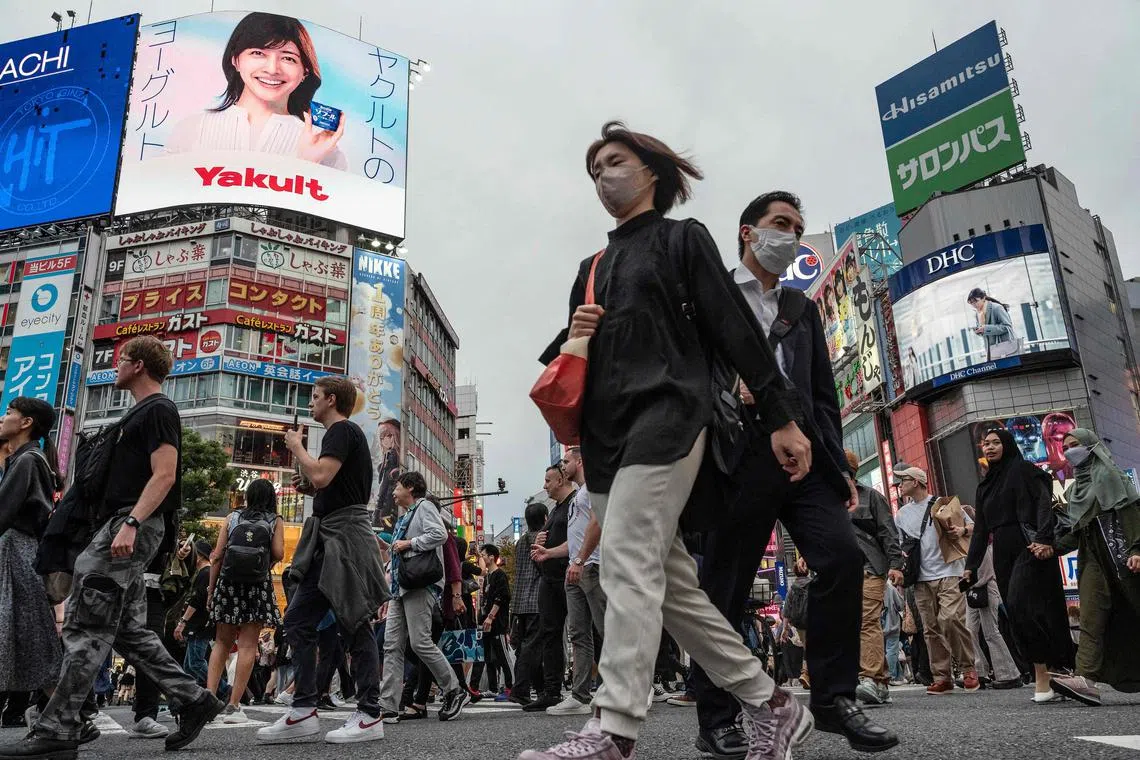Japan sees deepest contraction since Covid-19 pandemic
Sign up now: Get ST's newsletters delivered to your inbox

The Japanese economy shrank an annualised 2.9 per cent in the July-to-September period from the previous quarter, revised data showed.
PHOTO: AFP
Follow topic:
TOKYO - Japan’s economy shrank at the sharpest pace since the height of the Covid-19 pandemic, an outcome that complicates the policy path for the Bank of Japan (BOJ) amid soaring speculation it is edging closer to scrapping the world’s last negative rate regime.
Gross domestic product (GDP) contracted at an annualised pace of 2.9 per cent in the three months through September from the previous quarter as households reined in spending, revised figures from the Cabinet Office showed on Dec 8.
The updated figure marked the deepest drop since spring 2020, and compared with a preliminary reading of a 2.1 per cent drop and consensus estimates of a slightly narrower contraction.
The revised results confirm that Japan’s economic recovery from the pandemic lost momentum during the summer, with the outlook also shaky as slow and sticky inflation in overseas economies continues to weigh on domestic consumption.
Separate monthly data indicated more weakness in the current quarter, with household spending falling 2.5 per cent in October from a year earlier, an eighth straight drop. Nominal wage gains of 1.5 per cent in the month still left salary gains well short of the inflation that is weighing on consumer spending.
Taken together, the data complicates the calculus for the central bank as authorities wait for more evidence that a positive wage-price cycle is in place before stepping back from a massive stimulus experiment of more than a decade.
They also offer little respite for Prime Minister Fumio Kishida as he battles record low poll ratings amid criticism over a fund-raising scandal and his measures to tackle the impact of inflation.
“The revised data and the spending report show signs of weakness for consumption,” said Mr Nobuyasu Atago, chief economist at Rakuten Securities Economic Research Institute. “It’s risky for the BOJ to end the negative interest rate policy when the economy is already getting worse.”
“Still, I think their main scenario is they will make the move in January with new price forecasts,” Mr Atago said, referring to quarterly projections that are sometimes used to justify policy adjustments.
The weak GDP readings come amid surging speculation in markets that the BOJ will move early to scrap its negative interest rate policy. Market chatter has been fuelled by remarks from central bank chief Kazuo Ueda that his job will get more challenging from the end of 2023 and comments from his deputy apparently playing down the impact of a possible rate hike.
Japanese bond yields surged by the most in a year on Dec 7 and the yen strengthened almost 4 per cent against the US dollar.
The Japanese currency gained further ground on Dec 8 after the GDP result, suggesting that the poor outcome has not stemmed the tide of speculation that the BOJ may act as soon as its December meeting rather than wait for fourth-quarter GDP figures in February and annual wage negotiation data in March.
Almost all economists surveyed by Bloomberg before the yen’s surge on Dec 7 expect no change in policy from the BOJ when it concludes its next meeting on Dec 19.
Two-thirds of them see the bank scrapping its negative rate early in 2024. April is seen as the most likely timing, with a risk of an earlier move in January.
The GDP data showed that consumption continued to slide over the summer with a 0.2 per cent fall compared with an initial flat reading. Capital spending numbers were bumped up, but still showed a 0.4 per cent drop. Trade also weighed on growth.
The worse-than-expected consumer spending is a further sign that elevated prices are weighing on households.
The grinding impact of inflation on consumption carries a political cost for Mr Kishida. Support for his administration has languished despite his latest economic stimulus package meant to help households cope with the rising cost of living. BLOOMBERG

